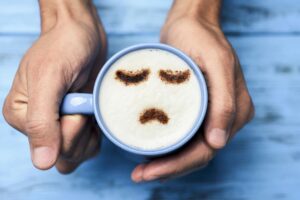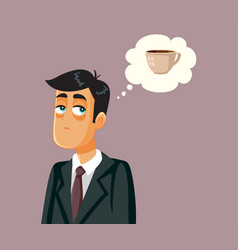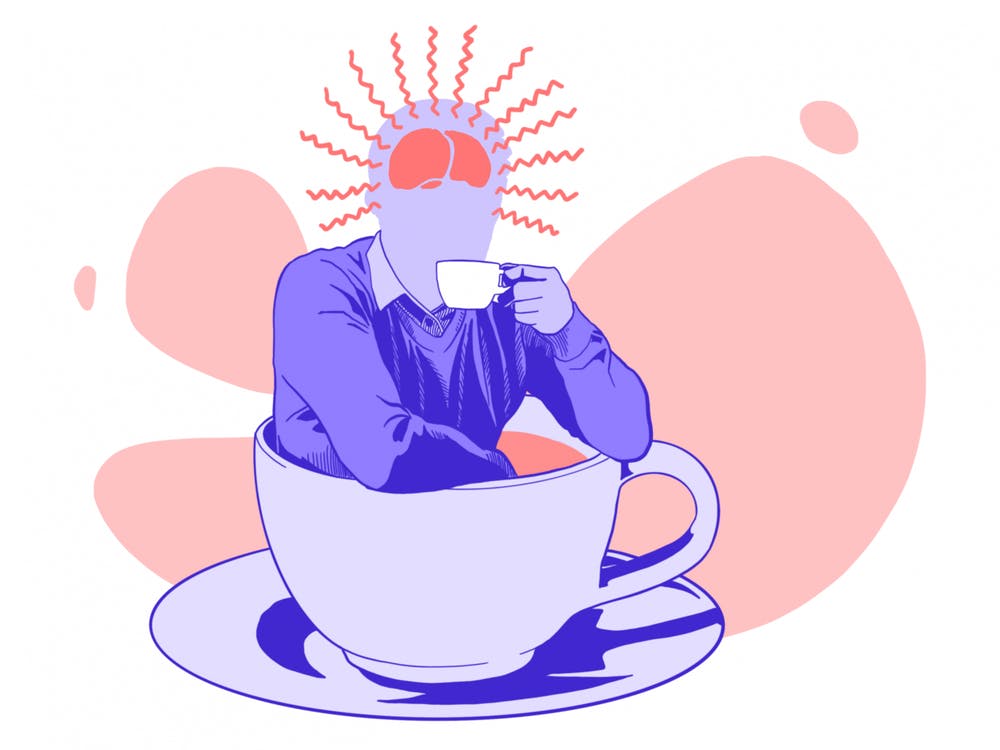Do you drink coffee or energy drinks to help you get through the day? If so, you’re not alone. Caffeine is one of the most popular drugs in the world, and for good reason – it helps us stay alert and focused. But what many people don’t know is that caffeine can also have a negative effect on our mental health. In this blog post, we will discuss the link between caffeine and depression and provide some tips for managing your caffeine intake.
Contents
Defining Caffeine

Caffeine is a stimulant drug that is present in coffee, tea, energy drinks, and chocolate. It works by blocking the neurotransmitter adenosine from binding to its receptors. This increases the activity of other neurotransmitters, such as dopamine and norepinephrine. The result is a feeling of increased alertness and energy.
It also has a number of other effects, including:
- increasing heart rate
- constricting blood vessels
- increasing urine production
All of these effects can be beneficial in small doses. However, too much caffeine can lead to problems such as anxiety, insomnia, and restlessness. It can also worsen symptoms of depression.
Defining Depression
Depression is a mental disorder that characterizes by a persistent feeling of sadness and loss of interest. It can also cause a number of physical symptoms, such as fatigue, changes in appetite, and difficulty concentrating. Depression is a serious condition that can lead to a decrease in quality of life and, in extreme cases, suicide.
It is important to note that depression is more than just feeling sad. It is a real medical condition that requires treatment. If you think you may have depression or its signs, it is important to talk to your doctor.
The Link Between Caffeine and Depression
While the exact cause is unknown, there is a strong link between caffeine and depression. It can have positive as well as negative effects on the brain. This difference in effect depends on the individual. We will learn about both aspects of the link between caffeine and depression.
Risks
Caffeine can have a number of negative effects on mental health. These include:
Interruption of the sleep cycle
Caffeine and sleep have a complicated relationship. You may have heard of people drinking coffee or other similar beverages to stay awake. This is because caffeine can interfere with the sleep cycle. It does this by preventing adenosine from binding to its receptors. Adenosine is a neurotransmitter that makes us feel sleepy. By blocking it, caffeine keeps us from feeling tired.
This may be beneficial if you need to pull an all-nighter or if you have jet lag. However, it can also lead to insomnia and other sleep problems. If you regularly drink caffeinated beverages, you may find it difficult to fall asleep at night. This can worsen symptoms of depression and make them harder to treat. It can also deplete the quality of your sleep, which can have a negative effect on mood and overall mental health.
Interference with neurotransmitters

Our hormones play a key role in managing our brain’s response to stress. When we’re under stress, our bodies release cortisol. Cortisol is a hormone that helps us deal with stressful situations. It does this by increasing the activity of neurotransmitters such as dopamine and norepinephrine.
Caffeine can also increase the activity of these neurotransmitters. This may be beneficial in small doses, but too much can lead to anxiety and other mental health problems. It can also interfere with the way our brains process serotonin. Serotonin is a neurotransmitter that plays a role in mood regulation. A disruption in serotonin levels is thought to be one of the main causes of depression. This imbalance can be caused by a number of things, including stress, diet, and genetics.
Cortisol, which is the stress hormone, can also be affected by caffeine. When we’re under stress, our bodies release cortisol. Cortisol is a hormone that helps us deal with stressful situations. It does this by increasing the activity of neurotransmitters such as dopamine and norepinephrine.
Caffeine can also increase the activity of these neurotransmitters. This may be beneficial in small doses, but too much can lead to anxiety and other mental health problems.
Reduced efficacy of medication
Caffeine can also make it difficult for people who are taking antidepressants to get the full benefit of their medication. This is so due to the fact that caffeine inhibits the activity of certain enzymes that are responsible for breaking down the medication in the body. This can reduce the efficacy of antidepressants and make symptoms harder to treat. Moreover, the mechanisms of the medications and caffeine also interact in a way that can cause side effects such as anxiety and agitation.
Worsened symptoms
There is an evident connection between caffeine and anxiety. Caffeine can worsen symptoms of anxiety and make them more difficult to manage. It can also cause or worsen panic attacks in some people. In addition, caffeine can trigger mania in people with bipolar disorder. Mania is a state of elevated mood and increased energy that can lead to risky behaviors and impulsive decisions. Some of the most common symptoms that may be vulnerable to caffeine include:
- feeling restless or agitated
- feeling anxious or stressed
- having trouble sleeping
- feeling irritable or on edge
- feeling dizzy or lightheaded.
These are only a few examples, but it is important to be aware of how caffeine may affect your mood and mental health.
Imbalance of other mental disorders
It is no secret that mental health disorders are not always easy to manage. There are a variety of different symptoms and each person experiences them in their own way. This can make it difficult to find the right balance of medication and therapy. Caffeine can further complicate this process by exacerbating symptoms and interfering with medication. For example, people with ADHD may find that caffeine makes their symptoms worse. They may also find that it interferes with the efficacy of their medication. The same is true for people with OCD, who may find that caffeine increases their anxiety levels and makes it harder to control their compulsions.
Anxiety is one of the most common comorbidities of depression. In fact, it is thought that nearly half of all people with depression also have anxiety. This is not surprising when you consider the fact that both disorders share a number of similarities. Caffeine can worsen symptoms of anxiety and make them more difficult to manage. This is so because it increases the activity of neurotransmitters such as dopamine and norepinephrine. It can also interfere with the way our brains process serotonin.
Tolerance and withdrawal
When we become habitual of regular caffeine intake, our bodies become dependent on it. This means that we need to keep consuming caffeine in order to feel normal. If we suddenly stop or cut back, we may experience withdrawal symptoms such as headaches, fatigue, and irritability. These symptoms can be difficult to cope with and may last for several days.
Moreover, when we get habitual to a certain level of caffeine, we may need to keep increasing our intake in order to get the same effects. This is known as tolerance. Tolerance can lead to dependence and withdrawal, which can be difficult to overcome.
All of these factors indicate that there is a strong link between caffeine and mental health. If you are struggling with depression, anxiety, or any other mental health disorder, it is important to be aware of the role that caffeine may play. You should speak with your doctor or therapist about whether or not caffeine is right for you.
Benefits
Surprisingly enough, caffeine can also have some benefits for mental health. Some of the most common benefits include:
Lowers the risk of suicide
This is one of the most surprising benefits of caffeine. A number of studies have found that people who consume caffeine are less likely to attempt or die by suicide. One study even found that coffee drinkers were half as likely to commit suicide as non-coffee drinkers. While there is no concrete explanation for this link, it is believed that caffeine may have anti-depressive effects.
Fights inflammation
Inflammation is thought to play a role in the development of depression. This is because it can damage the brain and lead to changes in mood and behavior. Caffeine has been shown to fight inflammation, which may help protect against depression. This occurs because caffeine blocks the release of inflammatory cytokines. This is most common in people who consume high levels of caffeine.
Blocks mood-depressing chemicals
We know that brain chemicals or neurotransmitters play a role in depression. Caffeine is thought to block the effects of some of these mood-depressing chemicals. This includes adenosine, which is a neurotransmitter that helps to regulate sleep. When adenosine binds to its receptors, it promotes drowsiness by slowing down nerve cell activity. Caffeine prevents adenosine from binding and has the opposite effect by increasing nerve cell activity and making us feel more alert.
Caffeine also affects other neurotransmitters that are linked to depression, including serotonin and dopamine. These play a contributing role in regulating our mood, energy levels, and ability to focus. Low levels of serotonin are associated with feelings of sadness and anxiety, while low levels of dopamine have been linked to fatigue and low motivation. Caffeine increases the release of these neurotransmitters, which is why it can be effective in treating symptoms of depression.
Impacts gut health
There is a very direct link between gut health and mental health. This is because the gut is home to a large number of our body’s nerve cells or neurons. In fact, there are more neurons in the gut than there are in the brain. These nerve cells send signals to the brain that can impact our mood and behavior. The gut is also home to a large number of beneficial bacteria, which are important for maintaining our mental health. Caffeine has been shown to have a positive impact on gut health by promoting the growth of beneficial bacteria and reducing inflammation.
Increases alertness
Perhaps the most famous and well-known benefit of caffeine is that it increases alertness. This is because it blocks the effects of adenosine, which makes us feel sleepy. Caffeine also increases the release of other neurotransmitters like dopamine and serotonin, which can improve mood and increase energy levels. For people who are struggling with fatigue or low motivation, this can be a very helpful effect. Moreover, it also provides a boost of energy which can be beneficial for those who are feeling down.
Improves mood and cognitive function

Depression can lead to problems with memory, concentration, and decision-making. Caffeine has been shown to improve these cognitive functions by increasing activity in the prefrontal cortex. This area of the brain is responsible for executive function, which includes planning, organizing, and paying attention.
Furthermore, there is also a link between caffeine and improved mood. This is likely due to the fact that caffeine increases the release of neurotransmitters like dopamine and serotonin. Low levels of these neurotransmitters have a link with feelings of sadness and anxiety. Therefore, by increasing their levels, caffeine can help to improve their mood.
So there you have it! These are just a few of the surprising benefits of caffeine that may help to explain its link to depression. While more research is needed, it is clear that caffeine can have a positive impact on mental health.
However, it is important to remember that these benefits are only temporary. Caffeine is not a cure for mental health disorders and it should not be used as a replacement for medication or therapy. If you are struggling with your mental health, please reach out to a professional for help.
Sources Of Caffeine
Caffeine is a naturally occurring substance that can be found in a variety of plant-based foods and drinks such as:
- coffee
- tea
- cocoa beans
- cola
- energy drinks
- sports drinks
- sodas
Moreover, caffeine is also present in a number of products such as:
- certain medications (like pain relievers and cold remedies)
- supplements
- gum
- chocolate
- ice cream
Caffeine can also be consumed in pill form. These pills are typically taken before exercise or during periods of mental or physical stress. Please note that caffeine pills can be very dangerous and should not be taken without the supervision of a healthcare professional.
How Much Caffeine Is Safe To Consume?

The amount of caffeine that is safe to consume varies from person to person. Factors that can affect this include: age, weight, health conditions, and pregnancy status. Therefore, it is important to speak to a healthcare professional before consuming caffeine, especially if you have any underlying health conditions.
Generally, most healthy adults can safely consume up to 400 mg of caffeine per day. This is equivalent to about four cups of coffee. However, it is important to note that some people are more sensitive to the effects of caffeine than others. Therefore, they may need to limit their intake accordingly.
Pregnant women and children should avoid consuming caffeine as much as possible. Pregnant women are advised to consume no more than 200 mg of caffeine per day (about two cups of coffee). Children should also avoid caffeinated products, especially energy drinks, as they can be very dangerous.
For people with depression or other such conditions, the quantity of caffeine for consumption should be under observation as it can interact with certain medications. It is always best to speak to a healthcare professional before consuming caffeine if you have any concerns.
While caffeine is generally safe in moderation, it can be harmful if consumed in excess. This is because it is a psychoactive substance that can alter our mood and behavior. Therefore, it is important to be aware of the potential risks that associate with its consumption.
In recent years, there has been an increasing amount of research into the link between caffeine and mental health. While the jury is still out on whether or not caffeine causes depression, there are a number of studies that suggest there may be a connection. If you have depression and think your caffeine consumption may be playing a role, it is important to speak to a healthcare professional.
Conclusion
The surprising link between caffeine and depression is still something that needs to be further studied. It can have both beneficial impacts as well as risks. Therefore, it is always best to speak to a healthcare professional before changing your caffeine intake.
For more information, please contact MantraCare. Depression is a mental illness characterized by persistent feelings of sadness, hopelessness, and loss of interest in daily activities. If you have any queries regarding Online Depression Counseling experienced therapists at MantraCare can help: Book a trial Depression Therapy session


